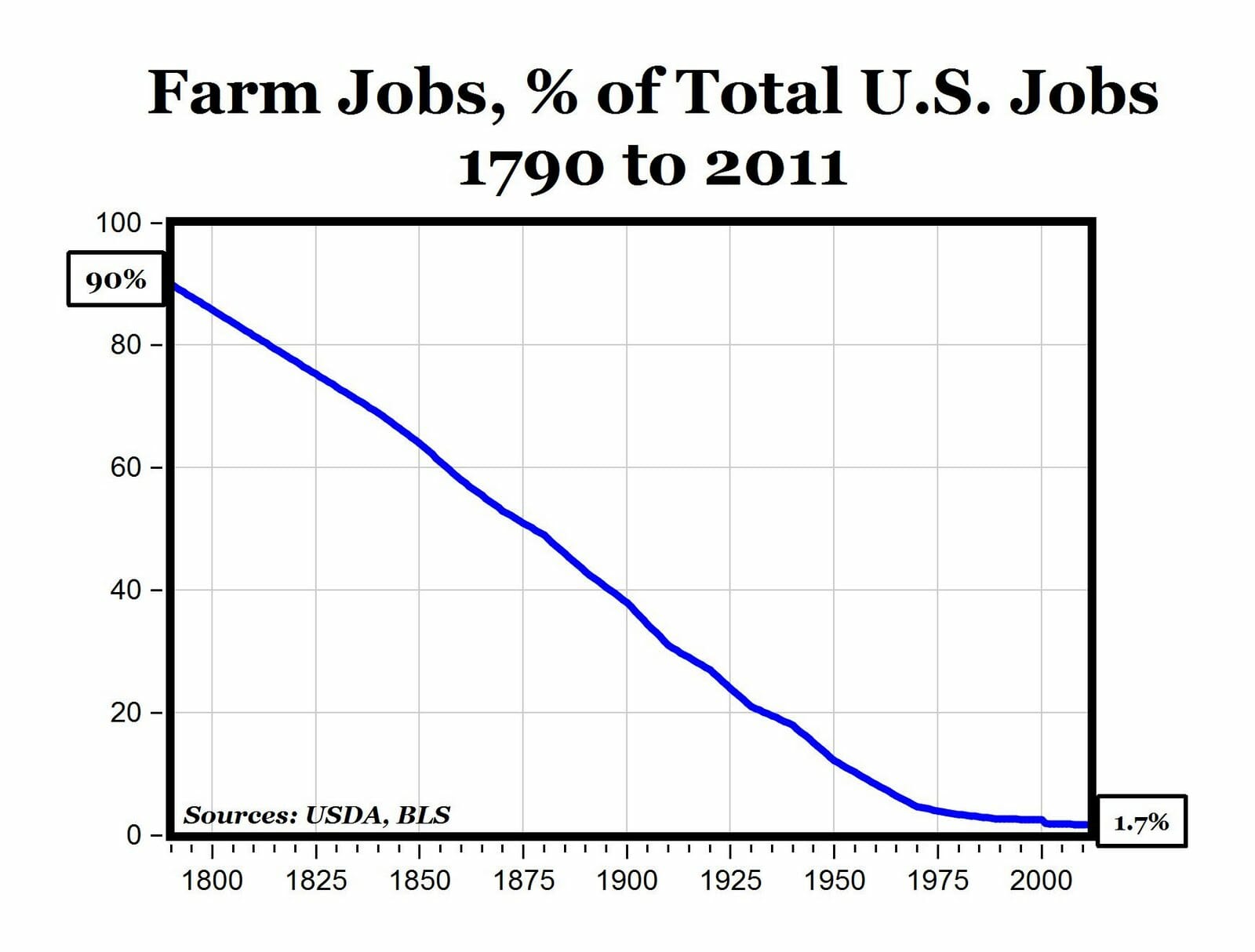|
I've been having this argument all day long on Facebook. Every reasonable person I know keeps saying: "But automation will create more jobs than it kills! Better jobs, maintaining the software/robots/helping people use those!" Is there good information out there about the # of jobs automation creates vs. removes? I've tried talking about the fact that companies simply won't invest in automation that won't save them labor money, but it's not sticking.
|
|
|
|

|
| # ¿ Apr 27, 2024 09:45 |
|
boner confessor posted:
I think you're missing what the other people are saying. They're software engineers or automation engineers, and they're saying that more jobs like theirs will be created. They're saying that when a menial job is created it will be replaced by a job maintaining whatever thing replaced them. I don't know how to argue against that though. Aside from, you know, simple math.
|
|
|
|
Paradoxish posted:It's shockingly hard to come up with this kind of data because the effects of automation on the labor market are slow and only really show up as long term trends. You can argue that industrial automation and offshoring created more retail jobs because things are cheaper and someone needs to sell them, but I can't prove that with data. In any case, this was always my favorite graph to post when this topic came up in USPol: I actually like that graph. It shows "As manufacturing output goes up, employment goes down." and everyone can relate to manufacturing. Also I get the feeling that the people I'm arguing against simply don't mind there being an underclass of underemployed or unemployed people who will simply be poor. They are OK with someone being miserable if they don't have the smarts to be an Engineer.
|
|
|
|
INH5 posted:Airline salaries make up 20% of the cost of an average airline ticket. Granted, I have no idea what portion of that is the pilots' salaries compared to everyone else. Aviation is a very interesting sector to bring up in an automation discussion. There are a couple of challenges in aviation that are different than automotive transportation: 1. Aircraft are more complex than cars, operating at higher speeds and altitudes. At the most simple level an aircraft has to be controlled in 3 dimensions rather than 2. They generally have 2 separate engines rather than 1. 2. Changes to environment around an aircraft affect it more than a car. For example, unanticipated updrafts can cause turbulence. Going in the wake of a larger plane can cause a loss of lift. 3. When emergencies happen, the procedures to address these are far more complex. In a car, you generally steer towards the side of the road and stop. Or just stop. In an aircraft you have to identify the problem, figure out if you can keep going and if not find an airport to land at or an open space to ditch at. Then land/ditch, which in and of itself is very complicated. 4. This is possibly ignored a lot: Aviation is very strongly regulated for safety. Automation in aviation hasn't focused on getting rid of the pilot, but making the pilot's job easier. Because flying requires a degree of problem-solving and risk mitigation that software has yet to replicate. So what we've seen is automation to: 1. Make navigation easier (we don't generally need dedicated navigators anymore!) 2. Make managing the engines and systems easier (we don't generally see the need for a dedicated flight engineer to handle oil cooling and engine performance!) 3. Make the act of flying in stable conditions easier (a pilot on a long-haul flight isn't 100% focused on flying anymore, allowing for longer flights and pilots to be used without as many breaks) 4. Give the pilot more information quickly (making landings, takeoffs, and emergencies safer) In addition, the level of regulation around aviation makes innovation slow to take hold in the commercial aviation sector, and very expensive to implement once it's ready. So a pilot is still probably cheaper. Many of these may be equivalent to automated trucking, but my guess is that driving is simply simpler overall than flying (except at the endpoints where you get off the highway). My guess is that we'll probably see team drivers go away as long-haul trucking becomes the sort of thing that can have driver-assistance devices. We'll still need drivers to do things like handling the last 5 miles of transport, and possibly doing trailer movement within yards. turn it up TURN ME ON fucked around with this message at 19:08 on Dec 6, 2016 |
|
|
|
It's interesting in the sense that a lot of work has been done there to automate it, and it makes sense to bring up as a comparison to automotive automation, but there's a lot more complexity. I bet we'll see a lot of people making the same comparison in the next bunch of months/years: We didn't put pilots out of a job, so stop worrying about truckers getting put out of a job.
|
|
|
|

|
| # ¿ Apr 27, 2024 09:45 |
|
mobby_6kl posted:
It takes about 3-4 years to become a commercial pilot. The joke is funny, but piloting a commercial airliner is one of those college+ level jobs. Being a trucker, in comparison, takes 2-7 weeks depending on the school and plan. Maybe we'll see pilots become a thing of the past, but it's a super difficult job to automate. As I said, where automation has impacted jobs in aviation is in the ancillary jobs and making the pilot take on more responsibilities. No more navigators, no more flight engineers.
|
|
|





